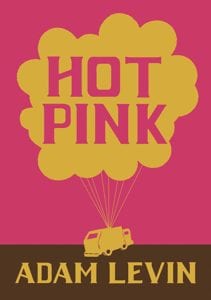
Shelf Unbound:Your award-winning debut novel The Instructions weighed in a 1,030 pages; Hot Pink is a collection of 10 short stories. Which is more challenging—developing and sustaining a long story or
encapsulating a short one?
Adam Levin: It’s a tie. I’m desperately afraid of boredom, so whenever I sit down to write fiction, I attempt the most challenging thing I can.
Shelf: What’s the starting point for you in concocting characters like Susan Fells, a precocious 15-year-old lesbian double-amputee with denial and mother issues, or Jane Tell, an art school dropout who entices strangers to injure her?
Levin: The starting point is almost always the sentences. I’ll write a bunch of sentences ‘til I get to one that I like, then delete the others. Of the one I like, I’ll ask myself one of the following questions: “What kind of person would say what was just said?” “What kind of person would think what was just thought?” “What kind of person would care to make the observation just made?” I’ll get some vague answer (e.g., “An angry young woman would say this.”), then write another sentence I like that follows the first, and I’ll ask one of the aforementioned questions again, but with a more specific subject, (e.g.,”What kind of angry young woman would say what was just said?”) or, if the second sentence seems to be a bit dissonant with the first, which is often the case when things are going well (at some point, fairly early on, some dissonance will definitely need to arise if I’m going to stay interested in what I’m working on), I’ll ask the question more argumentatively (e.g., “How could the angry young woman from the first sentence possibly be the same speaker/thinker/observer as the speaker/thinker/observer in this second sentence?”). And so on, ‘til the the third or fourth or twentieth sentence – ‘til whenever the dissonance threatens to become nonsense — at which point I’ll address the dissonance more directly, which gives rise to plot, which itself helps further determine who the character is.
Other times, I just get bored, so I cut some awkward young genius’s legs off or something, and then have to figure out how to justify that narratively.
Shelf: You write quirky characters who relentlessly fail each other and
themselves, and yet you portray them with what ultimately seems
like affection. Do you assess real people with the same generosity?
Levin: When I find them entertaining, yes.
Shelf: What are you working on now?
Levin: A novel, I think.
